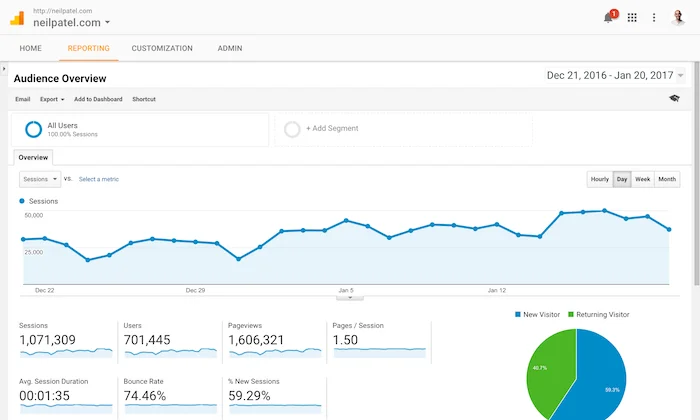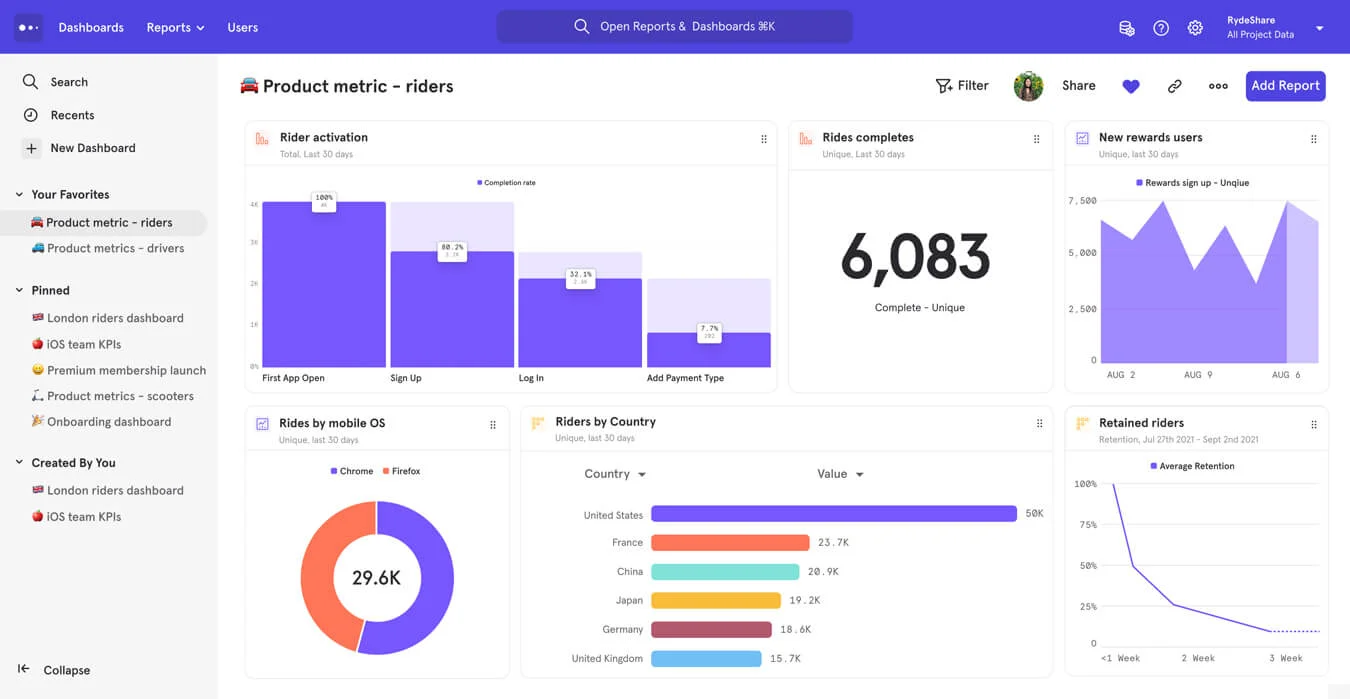In today's competitive market, it's essential to have the right data-driven insights to make informed decisions for your business. Website analytics tools can help you make crucial decisions for improving your website by tracking user behavior and providing valuable insights into how your website is performing.
If you are looking for analytic tools for your website, this guide has compiled a list of the best website analytics tools for 2023, empowering you to gain valuable insights, track metrics, and optimize your online presence for maximum impact. With information on their features and pricing, you will be able to choose from the best website analytics tools available in the market.
What Are Website Analytics Tools?
Website analytics tools are software designed to track, measure, and report website activity, including site traffic, visitor sources, and user clicks. Website traffic analytics tools help you understand what's happening on your website by providing insights that can be used to optimize user experience, drive engagement, and increase conversions.
Website analytics tools can be categorized based on how data is collected and the insights they provide. Some tools focus on quantitative website traffic data, such as sessions or bounce rates, while others offer qualitative user behavior data, such as heatmaps or customer journey analytics. Regardless of the specific data type, the top website analytics tools play a crucial role in helping businesses make data-driven decisions to grow and succeed.
10 Best Website Analytics Tools for Your Business
1. Google Analytics

Google Analytics is one of the most widely used and the best website analytics tools. It offers a range of features to help you understand user behavior on your site and provides actionable insights that can be used to improve your website's performance.
Features:
- Track quantitative data, such as sessions, bounce rate, and page views
- Monitor user behavior across devices and platforms
- Integration with Google Marketing Platform tools, such as AdWords and Search Console
Pricing:
The tool is free to use.
2. Mixpanel

Mixpanel is a powerful product analytics platform that helps businesses understand how users interact with their website or app. By providing insights into user behavior, Mixpanel enables businesses to optimize their site for increased engagement and conversions.
Features:
- Track user interactions and engagement with specific features
- Build retroactive funnels to visualize where users drop off
- Analyze customer retention and identify areas for improvement
Pricing:
Free for up to 20M events/month, with paid plans starting at $20/month
3. Adobe Analytics

Adobe Analytics is a comprehensive web and marketing analytics tool that is part of the Adobe Experience Platform. It offers a wide range of features designed to provide actionable insights to help businesses optimize their website and marketing efforts.
Features:
- Collect and analyze data from multiple channels for a complete view of your customers and business
- Segment customers to understand their behavior and differences
- Leverage AI, machine learning, and automation to predict and model customer behavior
Pricing:
Adobe Analytics shares price on request. It is better suited for scaling businesses rather than small businesses.
4. Matomo

Matomo, formerly known as Piwik, is one of the open source website analytics tools that emphasizes data protection and user privacy. With Matomo, you can analyze your website's performance while ensuring compliance with strict privacy laws such as GDPR, HIPAA, CCPA, LGPD, and PECR.
Features:
- 100% data ownership and privacy protection
- Comprehensive web analytics data, including behavioral data, SEO, and paid ad performance
- Cloud and on-premise hosting options
Pricing:
It is free for self-hosted users but will cost €19/month for hosting on Matomo's server. It also offers a 21-day free trial.
5. Hotjar

If you are looking for the best best heatmap tool for website analytics, Hotjar might be a great choice. Hotjar is a popular behavior analytics and user feedback tool. It is one of the best website analytics tools, as it offers visual insights into how users interact with your website. With features such as heatmaps, session recordings, and surveys, Hotjar helps you uncover areas for improvement and optimize your website for better user experience and conversions.
Features:
- Heatmaps to visualize user clicks, scrolls, and movements
- Session recordings to understand user behavior and identify areas for improvement
- User feedback tools to gather insights directly from your audience
Pricing:
Hotjar has a “free forever” plan to get started. The paid plans offer additional features and data storage.
6. HubSpot

HubSpot's Marketing Hub is an all-in-one marketing analytics platform that brings together a wide range of marketing tools and data in one place. With HubSpot, you can measure traffic, manage leads, automate email marketing, and track conversion rate optimization (CRO) efforts, among other things.
Features:
- Integrated content management platform for creating and distributing content
- Lead generation and nurturing features, including form and landing page builders and email marketing automation
- Built-in marketing analytics to turn quantitative data from SEO, social media, and lifecycle campaigns into actionable insights
Pricing:
There are free tools available for use. The paid plans start at $30 per month.
7. Kissmetrics

Kissmetrics is a product and marketing analytics software designed for scaling SaaS and e-commerce businesses. It provides quantitative data to help businesses understand user behavior on their site and identify areas for improvement.
Features:
- Customizable dashboard with key metrics at a glance
- Track power users with segmentation and cohort analysis
- Measure key revenue metrics such as customer lifetime value and churn rate
Pricing:
The pricing starts from $299/month.
8. SimilarWeb

SimilarWeb is one of the best website analytics tools with a competitive analysis platform that tracks online traffic data to help you measure your website's performance compared to your competitors and the overall market. By providing insights into your competitors' traffic and engagement, SimilarWeb can help you identify areas for improvement and growth.
Features:
- Track competitor traffic trends and website rankings
- Analyze traffic and engagement data across industries and time periods
- Identify and connect with qualified leads using business insights and data
Pricing:
It offers several free tools, with its paid Competitive Intelligence plan starting at $167/month.
9. Woopra

Woopra is an end-to-end customer journey analytics tool that tracks user behavior on your site to help you acquire and retain more customers. One of the reasons it is known as one of the best website analytics tools is because, with Woopra, you can gain deep insights into every touchpoint affecting the customer experience and optimize your website accordingly.
Features:
- Holistic understanding of user actions from the first touchpoint
- Track, analyze, and optimize every touchpoint affecting customer experience
- Automate workflows with built-in triggers and integrations with other web analytics tools
Pricing:
It has plans for free for 500K actions/month, and 14-day free trial, and a $999/month plan.
10. Chartbeat

Chartbeat is a content analytics software designed to help you grow your audience by delivering insights to improve your content. As one of the best website analytics tools, Chartbeat can understand how your audience connects with your content across platforms, channels, and devices and use this insight to optimize your content strategy.
Features:
- Real-time data on audience engagement with content, including videos
- Historical dashboard for assessing content performance, KPIs, and trends over time
- An intuitive user interface for easy analysis and decision-making
Pricing:
On request
Factors to Consider When Choosing a Website Analytics Tool
Choosing the right website analytics tool is critical as it helps you determine your business's online future. With so many options available, it can be challenging to choose the right one for your business needs. Here are a few factors to consider while choosing a website analytics tool:
Business Size and Requirements
Different tools cater to different business sizes and requirements, so it's essential to choose a tool that suits your specific needs. For example, Adobe Analytics is designed for scaling businesses and may not be well-suited for small businesses, while Matomo is an excellent choice for businesses with strict privacy requirements.
Amount of Data
Another thing to consider is the type and amount of data you require for your business goals. If you want detailed reports on user demographics or conversion rates, then you may need a tool with advanced segmentation capabilities. On the other hand, if simple metrics like pageviews and bounce rates suffice, then a basic tool may do just fine.
Ease of Use and Integration
It is important to consider the tool's ease of use and integration with other platforms and tools. If you're new to website analytics, a tool with a user-friendly interface and comprehensive support resources can help you get started quickly and effectively. Additionally, selecting a tool that integrates with your existing marketing, SEO, or other platforms can save you time and effort in the long run.
Customization and Flexibility
The best website analytics tools offer a high level of customization and flexibility for you to meet your specific goals and needs. For instance, if your tool can track a variety of metrics, such as traffic sources, user behavior, and conversion rates, it can give you valuable insights into how users interact with your website.
Scalability and Customer Support
Make sure you choose an analytics platform that can progressively handle large amounts of data as your website grows in size and complexity. Also, knowing what level of customer support you expect from vendors is essential. Ensuring they meet those standards will go a long way toward maximizing results from selected website analytics tools.
Conclusion
Website analytics tools are vital for understanding your website's performance, user behavior, and audience demographics. The best website analytics tools provide valuable data on traffic, conversions, SEO, and user experience. With this information, you can optimize your website, enhance user engagement, and make data-driven decisions to achieve your business objectives effectively.
Choosing the best website analytics tools is essential for optimizing your website, improving user experience, and driving growth for your business. By considering factors such as your business size, requirements, and existing platforms, you can select a website analytics tools online that best meets your specific needs. Explore the top 10 website analytics tools listed here, and start making data-driven decisions that will help your business succeed in 2023 and beyond. You can also sign up for a free 7-day trial with Scalenut to optimize your website for better search engine rankings.
About Scalenut
Scalenut is an AI-powered SEO and content marketing platform that helps discover and create relevant content for your customers. Be it brainstorming a content strategy, creating comprehensive briefs, generating the content, or optimizing it per the best SEO practices, Scalenut has made the process extremely easy. Click here to create a free account and explore the many features of this tool.








.webp)


